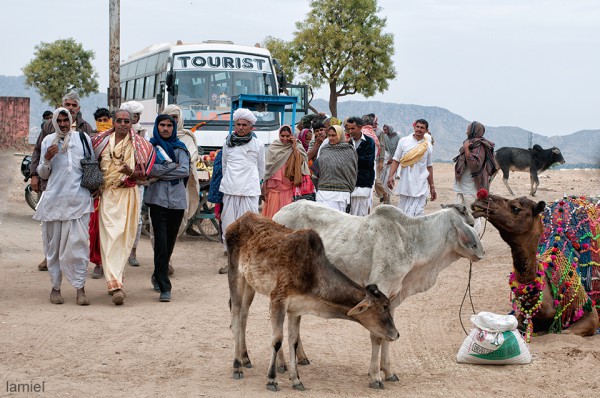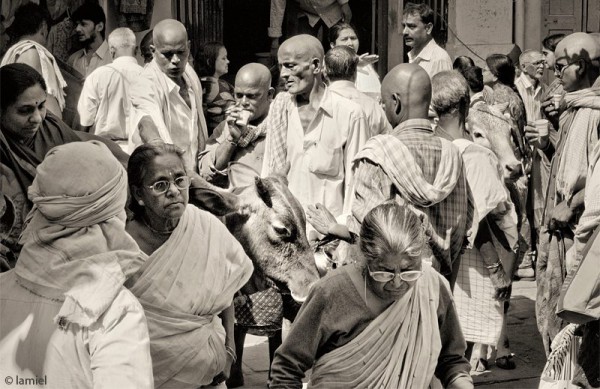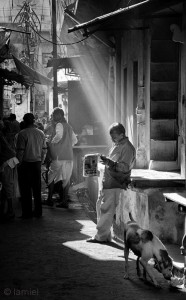A Dynasty of Dust
by Marc de Faoite

All images: © copyrighted by Miguel Lamiel, unless otherwise indicated. Use without permission is prohibited by law. All rights reserved. http://www.redbubble.com/people/lamiel, http://www.lamiel.info/
Most of Pushkar’s pilgrims arrive, grimy and travel-worn, at a parched flat field just outside the town. The locals call it the bus station, and there is constant movement, each new bus dragging a billowing brown cloud. They stop and disgorge an impossible number of passengers who stand around and wait while agile young men retrieve their baggage from the precarious pile of luggage on the roof. Mothers wipe dust-encrusted snot from their children’s faces, the toddlers looking strange and unearthly with shaven heads and rims of smudged black kohl drawn around their eyes. Some of the men stretch their arms, their fingers interlocked behind their heads, their shoulders preternaturally supple from childhoods of bowling cricket balls. The older men cough and spit into the dust, raising tiny clouds. Their tired eyes gaze out at the wind-smoothed dunes, and beyond them out toward the horizon where milk tea-brown earth meets a hazy soiled-blue sky.
Other visitors are dropped directly at their hotels. They daintily step down from Ambassador taxicabs that once were white, but are now powder-tainted beige from the dusty, winding roads. The men carefully lift their long white lunghis so that they don’t trail along the ground, while the women do the same with their colorful silk saris. For a fleeting instant, an ankle bracelet reflects a flash of sunlight.
Then there are people like me, who take a thirty-minute auto rickshaw drive from the railway station in nearby noisy Ajmer. The motor whines as the driver wills his vehicle upward and across a pass between the lesser peaks of the Aravalli range. These are India’s oldest mountains and stretch across the northwest from the Punjab and the Sindh all the way south to the edge of Gujarat. I am thankful for the fine cotton scarf I use to mask and protect my nose and mouth from the dust stirred up by buses that insist on overtaking us on tight corners.
The driver knows a place I can stay. It is run by his cousin. Auto rickshaw drivers always know a place to stay. They are always run by their cousins, or their uncles, or their brothers, or their sister-in-law’s cousin’s best friend’s niece. I hand over a little wad of banknotes. They are grubby and cloth soft. I thank the driver and tell him that I will find a place myself. I lift my bag and walk on through the town.
The ancient town of Pushkar, mentioned in the Mahabharata, the Ramayana, and the Puranas, has drawn pilgrims from ages old and new. Here, at the edge of the desert, the world is made of dust. Stirred up by every passing vehicle and every falling foot, it coats everything with a powdery second skin that is slightly rough to touch. It fills eyes and ears and noses, subtly altering perception, hiding everything behind a gauze-like filter, filling the columns of sideways sunlight that cut through the leafless branches so that the light seems almost as solid and as textured as the dusty trees themselves.
Wind-strummed kite strings cut across cloudless winter skies, singing notes from otherworldly scales. Small boys wildly gesticulate from flat rooftops all across the town, twirling wrists, jerkily saluting the sky, tugging and pumping at the threads that connect them to above. The thin paper squares soar and flap and rattle in the breeze, rising and falling and spinning, describing arcs ascendant and descendant, or when lines break, gently floating, drifting, gliding down toward the earth.
With my bag, I am easily pegged as a new arrival. I am followed by calculating eyes. Men call out to me with exaggerated smiles. “Looking for room? Cheap price. Twenty-four-hour, full power, hot shower, very clean, sir. You just look see.”
Shopkeepers sweep open palms toward their shops. “No cost for looking, sir. Different sizes, different colors. You give me good price, I give you good price. Best price. Very bestest price.”
Every few meters I am assailed by over-friendly shopkeepers, enthusiastic travel agents, and muttering drug dealers.
And the extended hands. The frail old women. The silent pleading eyes that hold little hope. The fingers pinched together that gesture toward the mouths.
India can harden hearts or fill them with the ripe, sweet fruit of compassion. If the pilgrim is sincere, and attentive, and lucky, then India might deign to reveal partially glimpsed hints of the truths that lay hidden beneath the surface and beyond the cloaking veil of maya woven out of dust and traffic diesel fumes and smoke from wood-fires in rusted upright oil drums.
It’s winter—the low season. It doesn’t take me long to find a room.
The town centers on a lake said to heal diseases of the skin that the insalubrious water looks more likely to cause than cure. The temples surrounding the lake are dedicated to Vishnu, the preserver of equilibrium, or to the transformative power of Shiva. But most of Pushkar’s pilgrims converge upon the Jagatpita Brahma Mandir, the best known of the very few temples in India dedicated to Brahma, the creative aspect of the Hindu triumvirate.
Devout Hindus try to visit Pushkar at least once in a lifetime, but it is also an unlikely desert convergence of other pilgrims and travelers. In Pushkar East meets West and Middle East. The narrow streets are lined with shops catering to pilgrims and tourists alike.
One of the first things that the visitor to Pushkar notices, apart from the dust, is the dozens of garment sellers and tailors who line the main bazaar, seemingly disproportionate to the little town’s size. Pushkar, with its laid-back vibe, is much favored by foreign clothing traders who buy in bulk and sell in shops, fairs, or festivals in Europe, America, or Australia. Rajasthani colors are vibrant, and prices are very reasonable for good quality cloth and tailoring; think more grunge or hippie-chic than Savile Row, though if you really need a formal suit, you could get one made here too.
Pedestrians share the shaded lanes with wandering cows and calves, and bulls who remain placid and unreactive to the violently screeching horns of motorbikes driven at breakneck speeds by testosterone-fueled young men dressed in jeans and loud, checked shirts. The older men’s attire is more traditional, with lunghis tied like bloomers on their legs, their heads decorated and enlarged by colorful, outsized turbans and ornately curled mustaches. The women hide their faces behind thin veils—protection from the swirling dust, the skin-darkening sun, and the ever-prying eyes of men.
The narrow bazaar is a symphonic soundscape disguised by sights and smells—a cacophonic remix of random, torn-off bites of Bollywood, clanging bells from the bathing ghats, and calls from merchants both stationary and ambulant. Popcorn and peanut men rattle and clang metallic rhythms against their charcoaled cooking pans. Apt to slip by unheard is the slightest shift of clinking charcoals, as twice-cooked wood radiates energy absorbed from sunlight past, sending bubbles through pots of milk and sugar. Aromas of cardamom and overly sweet rose, mixed with the baby smell of warmed milk and the omnipresent perfume of cow dung and the drains, all divert attention from the ear until it is reawoken by the rhythmic slapping of running children’s footfalls echoing against the labyrinthine side lanes. These hum with the song of keening kite strings, babies crying, unseen mothers and wives berating unseen others from indoors, all ameliorated in tune and tone by random contributions from a mixed choir of camels, cows, and goats, and underscored by the percussive impact of workmen’s hammers and the constant cacophony of traffic horns.
By the lakeside, grungy backpackers and would-be holy men rival one another in the length and disarray of their matted dreadlocks, both parties sucking on baked-earth chillums, seeking herbal liberation and escape. Other travelers dress in neatly pressed clothes and sport tidy haircuts as if they have stepped right off the streets of Stockholm, Munich, or Rotterdam. They frequent the more luxurious hotels that backpackers can’t or won’t afford, and follow guides, sometimes local men, sometimes thick doorstops of printed paper, and sometimes both. They are trapped and taxed by fancily dressed “holy men” who patrol the fifty-two ghats surrounding Pushkar’s central lake. These charlatans tie red wrist-strings and daub white foreheads with crimson kumkum in exchange for hesitant and extortionate donations. When led to shops that pay their guides commission, the straitlaced visitors are too polite to walk away and the shopkeepers too wily to let them escape unencumbered with unplanned purchases. Other tourists climb aboard groaning camels garlanded in bright purples, greens, pinks, and reds. These strange beasts lurch around the streets and along the sandy pathways of the outskirts of the town, followed by grubby, half-clothed, snot-nosed children who alliteratively call out for gifts pictorial, pecuniary, and practical: “poto, paisa, pen.”
Pushkar’s varied visitors have a choice of busy restaurants. Their menus cater to the peculiar cultural mix; they feature spaghetti as often as chapatis, and lattes and espressos rival chai. But most striking is the Middle Eastern influence. Everywhere are signboards and menus written in a mix of Hindi, English, and Hebrew, promising falafels and hummus, but also specialties like ziva, fatut, and lafa, tahini, matbucha, shashuka and malwach.
These restaurants are filled with countless curly-haired young Israelis enticed and seduced by the freedom and myriad temptations of traveling in India after years of restrictive and obligatory military service at home. They are pilgrims, too, seeking to find themselves—or lose themselves—and by all accounts generally succeeding in achieving some measure of both. Their initiatory travels are a veritable rite of passage, their migratory route as codified as any seeker’s. From favored Himalayan haunts like Manali and Dharamkot, they move en masse southward with the seasons toward the beaches of Goa. Pushkar is an essential and inevitable way station on that route. Some will stay here for months, and learn to play tabla or sitar and spend their evenings sipping potent bhang lassis in rooftop restaurants. Or you will find them smoking fragrant, hand-rolled cigarettes on the mountain trails that lead to the temples that sit upon the peaks. Along the path, the pilgrim must face the unsolicited attentions of greedy monkeys, confront the risk of twisted ankles on the dust-slippery slopes, and run the gauntlet of the usual host of orange-clad sadhus.
Shopkeepers will tell you that there are fewer Israelis than in the past. In recent years visa rules have changed, making it more difficult for them to visit or stay. This has had a direct and deleterious effect on many of Pushkar’s shops, restaurants, and hotels. But new visitors are coming. An enthusiastic and enterprising restaurant owner tells me he wants to translate his menu into Russian.
On the outskirts of the town are fields of roses, chrysanthemums, and marigolds, every color tainted by a patina of gray dust. The flowers will be woven into garlands to be offered at the temples to the gods. Later, they are recycled as floral foodstuff for the ever-present cows and return in a digested incarnation as hand-molded discs of cow-pats impressed with the imprints of splayed fingers and drying on sun-baked, south-facing walls. The dried dung smolders and gives off enough heat and harsh smoke to boil and perfume a pan of milk or tea, sipped by the workers who collect these flowers. All these things are an encapsulation of the perfect Vedic cycle of growth, decay, and transformation. In Pushkar the spiritually sensitive mind easily slips into this way of seeing things.
Back in the town, I join the crowd that hovers around a little stall built around a bicycle. Standing back near a shop front, I slurp-spoon creamy rose-flavored lassi from a handmade baked-earth cup, a calculated risk that takes into account the distance to the nearest bathroom. I stand and watch the men who stand watching me as they warm their hands on charcoal embers glowing in a rusted metal bowl. Their woolly hats are pulled down to their eyebrows, check-patterned scarves sit shoulder-hunched around their thin and wrinkled necks. Their ornate mustaches are more steel-gray than black. Their eyes are lighter colored, too. Is there a hint of green or blue in the iris? Or has the desert sun caused cataracts or variations in the refractory qualities of the old men’s eyes?
I finish my lassi but can’t bring myself to hurl the empty cup to the ground to smash it like everyone else. I watch mangy brown stray dogs lap at the last few drops on the shattered shards of clay and turn my own cup in my hand, watching the constant and colorful flow of pilgrims on their way to or from the Brahma temple; they are a tiny sampling of the vast humanity of India, represented in myriad variants and variations of two eyes, a nose, a mouth, of cloth and garb and hair, veiled or turbaned in cotton, nylon, satin, or pure silk.
A reversing car breaks me from my reverie with a singsong chime, playing the tune of the Gayatri mantra, both cheerful and as saccharine as bazaar-bought milk-based sweets. This mantra can be heard elsewhere, in the temples and on the ghats, enounced in the traditional three tones in a minor key, handed down through the millennia from first and oldest of the Vedas: Rig. Thousands of years of hopes and wishes and desires and dreams infused into a four-lined chant, an impatient pleading to be liberated from the limitations of our mortal forms, a password to open doorways to ethereal and elusive levels of existence, a supplication to the elements for safe passage across the storming seas of the self, to reach the other side of our raging oceans and realize the promised potential of enlightenment. The car gear-shifts out of reverse and, mid-tune, the tinkling chime of the Gayatri mantra abruptly stops. I leave the busy street and climb the steep steps to a rooftop restaurant.
The sun sinks, leaving a dusty orange band above the horizon that diminishes proportionately to and in synchronicity with the darkening of the overhead sky. Stars poke feeble pinholes through the gray darkness. A mountain bears an ever-growing halo of yellow light. The bright flash of the first glimpse of rising moon shines like a full-beamed headlight on a quiet nighttime road. It takes two minutes for the moon to rise above the ridge, like a balloon slowly filled with breath, or a glowing mushroom rapidly extruded in nature documentary time-lapse—the earth laying a shining golden egg, shot out into space, an improbable pearl, giving light and life to the liquid flow of tides.
The dogs bark in the night, howls and yelps in need of grease around the edges, like the unoiled pulley wheels of village wells. Televisions echo through the empty streets, casting flickering fingers of light outdoors, while chants from the countless temples mix and hover and form a cloud that drifts over the town and rains Sanskrit-infused dust to fill the ears and hearts and souls of Pushkar’s residents and its visitors alike. Some will leave this pilgrimage town charged by these subtle vibrations, while others, whether unreceptive or ill-equipped, are unable to perceive the effects.
“These,” the restaurant waiter proclaims, “are the days of the Agorhi, who spread tamasya and darkness until the end of Kali Yuga and the start of next age of Satya Yug, the new age of Truth.”
He sips a cold Thums Up, twirls the ends of his mustache, and looks out into the darkness, toward the edge of the desert, where all life surrenders to the dynastic rule of dust.
![]()
 Marc de Faoite was born in Dublin but has lived more than half his life overseas in England, Belgium, France, India, and currently Malaysia, where he reviews books for the Star newspaper. His short stories and essays have been published in anthologies and periodicals online and in print in Malaysia, Singapore, France, England, Ireland, and India. Tropical Madness, a collection of his short stories, was published in 2013 and longlisted for the 2014 Frank O’Connor Short Story Prize. marcdefaoite.blogspot.com
Marc de Faoite was born in Dublin but has lived more than half his life overseas in England, Belgium, France, India, and currently Malaysia, where he reviews books for the Star newspaper. His short stories and essays have been published in anthologies and periodicals online and in print in Malaysia, Singapore, France, England, Ireland, and India. Tropical Madness, a collection of his short stories, was published in 2013 and longlisted for the 2014 Frank O’Connor Short Story Prize. marcdefaoite.blogspot.com






Great atmosphere and detail. The “poto, paisa, pen” brought back memories.
A wealth of details artistically crafted.
I loved the ‘I slurp-spoon creamy rose-flavored lassi from a handmade baked-earth cup, a calculated risk that takes into account the distance to the nearest bathroom’!
And the ending where all returns to dust.